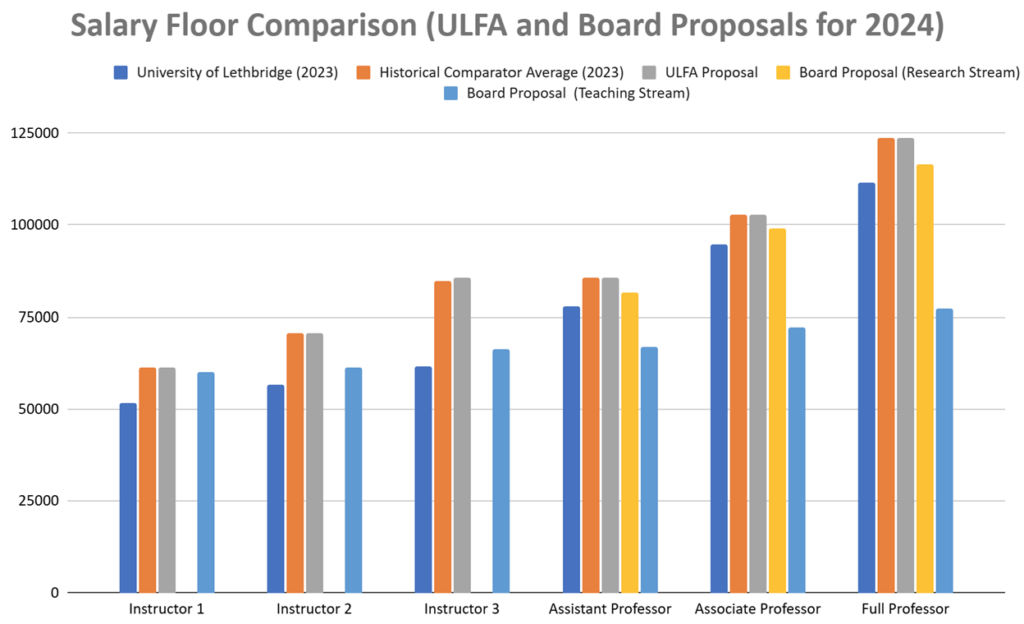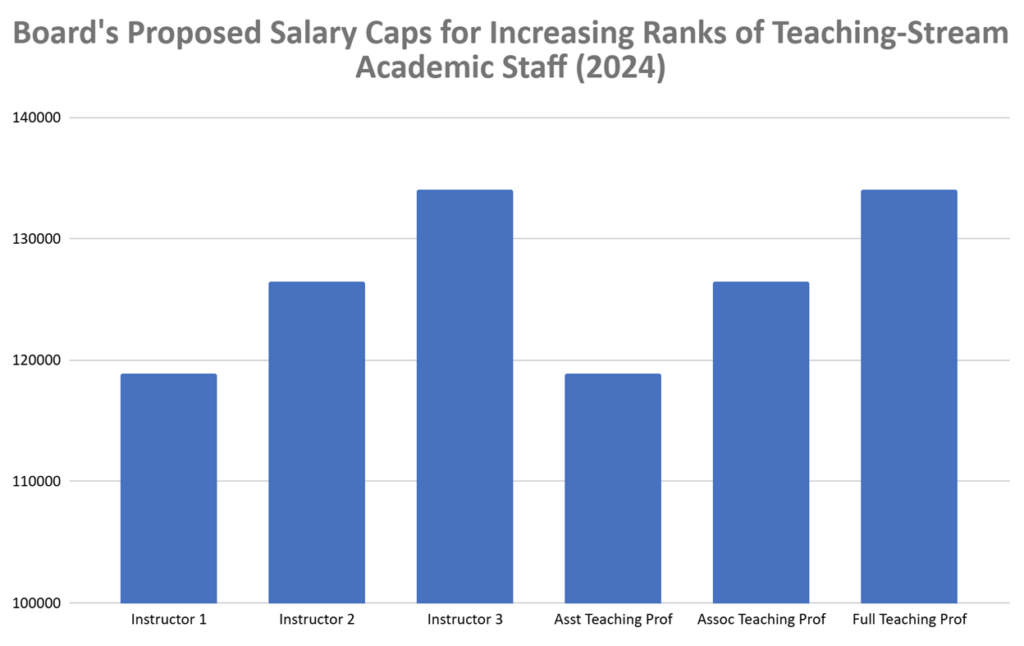The Board and ULFA negotiating teams held their thirty-second bargaining session toward a new Academic Staff Collective Agreement (ASCA) on the afternoon of October 24, 2025. Eight ULFA members attended as observers.
This is the second in a series on the full proposal package and supplementary documents tabled by the Board team at that session. Part 1 outlined the contents of the proposal package. This post highlights notable aspects of the Board team’s proposals for Schedule A and Schedule B.
Schedule A
This is the first proposal for Schedule A (salaries) to be tabled by the Board team in this round of negotiations. It includes four years of 3% COLA adjustments, retroactive to 2024 for current members only. It does not apply COLA adjustments to career progress increments or merit award contributions which have not increased in value since 2017.
Career progress increments are introduced for Instructors and Academic Assistants ($2,175/year) and Teaching-Stream Faculty Members ($2,300/year). As such, merit award contributions are harmonized to $625/year for all Members except Instructors or Academic Assistants at the maximum salary for their rank.
The proposal does not address ULFA’s mandate to increase salary floors to market rates at any rank, except for Instructor 1. The proposed salary floor for the new rank of Assistant Teaching Professor is within $500 of the Instructor 3 salary floor, and subsequent floors increase by approximately $5,000 per rank. Under Article 28, promotion to the next higher rank is normally considered after five to ten years in a rank.

The Board also proposes a salary cap for Assistant Teaching Professors that is lower than the current cap for Instructor 2 and a salary cap for Associate Teaching Professors that is lower than the current cap for Instructor 3. Under the Board’s proposal, an Instructor 1 would not be eligible for transition to Assistant Teaching Professor, and the rank of Associate Teaching Professor would require a promotion from Instructor 2 or 3.

The Board’s proposal presumes a four-year term for the Collective Agreement and does not commit to COLA adjustments beyond June 30, 2028 or career progress increments or merit awards beyond June 30, 2029.
Schedule B
The Board team’s October 24 Schedule B proposal contains partial responses to some benefit concerns in the ULFA bargaining mandate. These include:
- moving to the current Alberta Blue Cross (ABC) dental fee schedule,
- adopting ABC’s managed fee guide for eye exams and paramedical practitioners (e.g., registered psychologists and massage therapists),
- increasing the covered amount (per participant per year) for psychologists to $2,500 and allowing a combined total of up to $1,000 for other paramedicals, and
- adding coverage for glucose sensors and up to $250 per year for vaccines.
The Board team’s proposal to shift ULFA’s drug plan from 100% reimbursement (open formulary–all valid prescriptions filled) to 100% drug card (managed formulary) involves cost-saving strategies to off-set the drug card costs. If implemented as proposed, there would be two levels of managed formulary strategies.
- Standard (would only apply to new members or new drug starts):
- special authorization: for high-cost specialty drugs (e.g., treatment cost > $10,000/year), the prescriber must submit a request for coverage of the drug to ABC
- step therapy: for traditional drugs, an automated claims process that fills a prescription with a first-step lowest-cost drug approved for treating a condition; if the first drug doesn’t work, the prescription is filled with the next lowest-cost drug; the drug dispensed may not be the one named by the prescriber.
- Additional:
- generic substitution: prescriptions will be filled by generic drugs if available, unless the prescriber overrides this by specifying no substitutions
- maximum allowable costing: for proton pump inhibitors and certain drugs used to treat high blood pressure and cholesterol, ABC sets a maximum cost the plan will cover for drugs falling within groups of drugs used to treat the same condition
- maintenance medication program: for select long-term drugs, after a stabilization period, allowed dispensing fees are only for fills covering 90 to 100 days.
Other benefits improvement priorities in the bargaining mandate that are unaddressed in the Board team’s latest Schedule B proposal include:
- vision care: no improvement aside from increased coverage of eye exam fees
- professional supplement: not harmonized for teaching-stream and research-stream academic staff, and not available to Sessional Lecturers
- out-of-province emergency travel benefits: for members beyond age 65 and eligible dependents, only covered for trips of up to 30 days (an example of an EDI aspect of our bargaining mandate)
Currently, the costs of the ULFA benefits plan exceed the amount contributed by the Board (ASCA 2020-2024, Schedule B.04.1), so all additional costs are borne by members. The proportion of the total plan costs paid by members today is roughly 20%. In the Board team’s October 24 Schedule B proposal, all costs of the Employee and Family Assistance Program would be covered by the Board. For extended health and dental, and vision care, the Board would cover 80% of the benefit rate costs, and ULFA members would cover 20% of those costs.
Currently, the remaining scheduled Fall 2025 negotiation dates are November 12 and 14, and December 11 and 12. A summary of the progress of items opened in this round of bargaining is available here.


